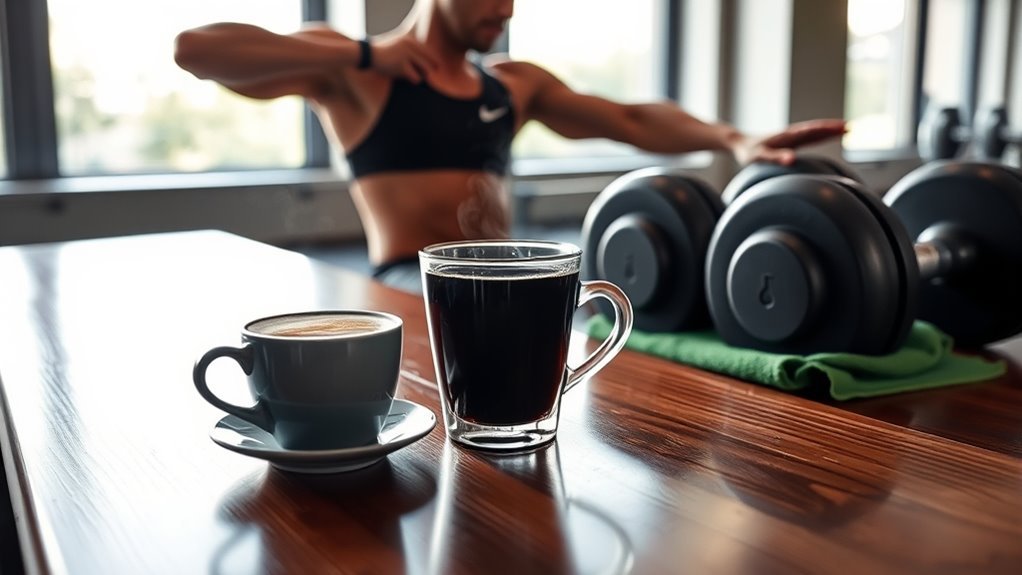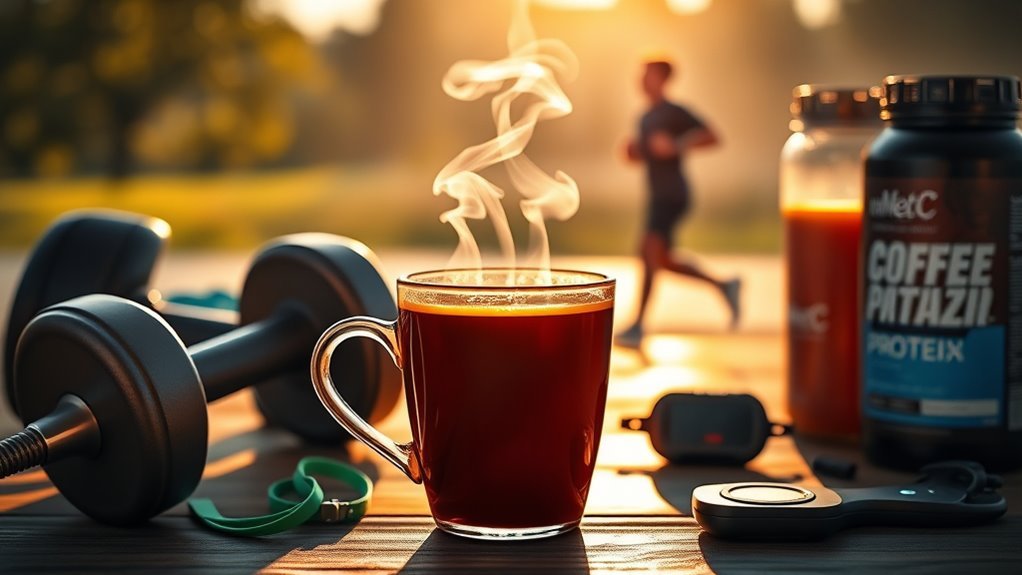The Benefits of Coffee for Fitness Enthusiasts
Coffee can greatly enhance your fitness routine by boosting energy levels, endurance, and mental clarity during workouts. It helps increase fat oxidation and aids in recovery through improved glycogen replenishment and reduced muscle soreness. Consuming coffee strategically, either before or after exercise, can maximize these benefits. However, be mindful of potential downsides like dehydration and tolerance. If you’re curious about optimizing your coffee intake for fitness, there’s more to discover about its impact on your performance and recovery.
Understanding Caffeine and Its Effects on the Body

Although caffeine is often celebrated for its stimulating effects, understanding how it interacts with your body is vital for maximizing its benefits, especially in the context of fitness. Caffeine metabolism varies considerably from person to person, influenced by genetic factors, lifestyle, and diet. When you consume caffeine, it’s absorbed quickly, enhancing your performance and focus. However, regular consumption can lead to tolerance effects, meaning you might need more caffeine over time to achieve the same impact. This tolerance can alter your body’s response, potentially diminishing the benefits you seek in your workouts. As a result, it’s important to monitor your intake and adjust as necessary to maintain its effectiveness, ensuring you harness caffeine’s full potential without plateauing.
Enhanced Energy Levels for Better Workouts
When you consume coffee before workouts, you may experience increased endurance, allowing you to push through those tough sessions. Research shows that caffeine can enhance focus and motivation, helping you stay mentally engaged during your exercise routine. This boost in energy levels can greatly improve your overall performance in the gym.
Increased Endurance During Exercise
Many athletes and fitness enthusiasts turn to coffee for its potential to boost endurance during exercise, and research supports this practice. Caffeine can enhance performance by increasing your stamina, allowing you to push through those last few reps or miles. Studies show that caffeine consumption may reduce perceived exertion, making workouts feel easier. However, it’s vital to evaluate your caffeine tolerance; what works for one person might not work for another. Pairing coffee with effective hydration strategies is important, as caffeine can have a diuretic effect. By balancing your coffee intake with proper hydration, you can maximize its benefits while maintaining peak performance during your workouts. So, grab that cup of coffee and get ready to elevate your endurance!
Improved Focus and Motivation
Coffee can greatly enhance your focus and motivation during workouts, especially when you’re feeling fatigued or unmotivated. The caffeine in coffee boosts alertness, helping you push through mental barriers. While everyone’s caffeine sensitivity varies, moderate consumption can improve mental resilience, allowing you to tackle more intense workout sessions.
| Benefit | Explanation | Tips |
|---|---|---|
| Improved Focus | Increases concentration levels | Limit intake to avoid jitters |
| Enhanced Motivation | Encourages persistence | Pair with a workout plan |
| Mental Resilience | Builds mental toughness | Gradually increase intake |
Incorporating coffee into your fitness routine can empower you, making every workout feel achievable. Enjoy the freedom to explore your limits!
Improved Endurance During Exercise

While it’s well-known that caffeine can boost energy levels, its role in improving endurance during exercise is particularly vital. Studies show that caffeine enhances performance by increasing adrenaline levels, which helps you push through longer workouts. If you maintain a proper hydration balance, you can experience these benefits without the negative effects of dehydration. It’s essential to understand your caffeine tolerance, as individual responses can vary; what energizes one person might not have the same effect on another. By tailoring your caffeine intake to your needs, you can optimize your endurance, allowing you to train harder and longer. So, next time you’re gearing up for a workout, consider that cup of coffee as a potential ally in your fitness journey.
Increased Focus and Mental Clarity
When you consume coffee, you may experience enhanced cognitive performance that can sharpen your focus during workouts. Research suggests that caffeine can improve reaction time, allowing you to respond more quickly to physical challenges. This heightened mental clarity can also boost your motivation, making it easier to push through tough sessions.
Enhanced Cognitive Performance
As you prepare for a workout or tackle a challenging task, the impact of caffeine on cognitive performance can’t be overlooked. Coffee isn’t just a pick-me-up; it can greatly enhance your cognitive abilities, leading to improved mental agility. Here’s how:
- Boosts focus, helping you stay on task
- Enhances memory retention for better learning
- Increases alertness, making you more aware of your surroundings
- Supports cognitive enhancement, aiding complex problem-solving
- Reduces fatigue, allowing for sustained mental effort
Improved Reaction Time
Improving your reaction time can be a game-changer in both fitness and daily activities, especially when caffeine is part of the equation. Studies suggest that caffeine enhances reaction speed by increasing alertness and focus. Timing your caffeine intake can further amplify these benefits, helping you stay sharp during workouts or competitive events.
| Caffeine Timing | Effects on Reaction Speed |
|---|---|
| 30 minutes before | Ideal boost |
| 1 hour before | Sustained alertness |
| During workout | Immediate enhancement |
| Post-workout | Recovery focus |
Greater Workout Motivation
Caffeine not only sharpens your reaction time but can also greatly boost your workout motivation through increased focus and mental clarity. When you sip on coffee before hitting the gym, you’re setting yourself up for success. Here’s how it helps:
- Enhances concentration on workout playlists
- Increases energy and reduces perceived effort
- Boosts mood, making you more resilient to challenges
- Provides clarity to focus on form and technique
- Inspires you with motivational quotes, keeping you driven
With improved mental engagement, you’ll find it easier to push through tough sessions. So, whether you’re tackling a heavy lift or a long run, a little caffeine can be the spark you need to elevate your workout motivation and performance.
Coffee as a Fat Burner
The role of coffee in enhancing fat metabolism has garnered significant attention in recent years. You might find it fascinating that coffee can boost fat oxidation, making it an effective fat burner. It contains caffeine, which stimulates the central nervous system and increases metabolic rates. Research suggests that this can lead to improved fat utilization during exercise.
| Component | Effect on Metabolism | Impact on Fat Oxidation |
|---|---|---|
| Caffeine | Increases energy levels | Enhances fat breakdown |
| Antioxidants | Reduces inflammation | Supports recovery |
| Chlorogenic Acid | Regulates glucose levels | Aids in weight management |
Incorporating coffee into your routine may help you achieve your fitness goals while enjoying your favorite beverage.
Greater Muscle Recovery Post-Workout

After a tough workout, you might be looking for ways to speed up muscle recovery, and coffee could be your ally. Research shows that caffeine can enhance glycogen resynthesis, reduce muscle soreness, and increase blood flow, all of which play a vital role in recovery. By incorporating coffee into your post-workout routine, you may find yourself bouncing back faster and feeling stronger.
Enhanced Glycogen Resynthesis
While you might be familiar with coffee’s role in boosting energy levels during workouts, it also plays a significant part in enhanced glycogen resynthesis, which is essential for muscle recovery post-exercise. Consuming coffee post-workout can accelerate glycogen storage in your muscles, aiding in the recovery process. Here’s how it helps:
- Promotes faster glycogen replenishment
- Improves overall recovery speed
- Supports muscle repair and growth
- Increases endurance for future workouts
- Enhances performance during subsequent training sessions
When you incorporate coffee into your post-workout routine, you’re not just enjoying a tasty beverage; you’re actively supporting your body’s ability to recover efficiently. So, next time you finish a workout, consider that cup of coffee as a recovery ally!
Reduced Muscle Soreness
Though it might seem surprising, coffee can actually help reduce muscle soreness, allowing for greater muscle recovery after intense workouts. Research shows that caffeine may mitigate delayed onset muscle soreness (DOMS) and enhance your overall recovery experience. By incorporating coffee into your post-workout routine, you could feel less discomfort and bounce back quicker.
| Benefit | Mechanism | Outcome |
|---|---|---|
| Soreness Reduction | Caffeine’s effects | Faster recovery |
| Decreased Inflammation | Antioxidants | Less muscle damage |
| Enhanced Performance | Energy boost | Improved endurance |
| Pain Perception | Endorphin release | Improved well-being |
Increased Blood Flow
When you consume coffee, you might be unknowingly enhancing your blood flow, which can significantly contribute to muscle recovery after workouts. Improved vascular health leads to better circulation benefits, allowing nutrients and oxygen to reach your muscles more effectively. Here’s how coffee aids in recovery:
- Increases blood flow to damaged tissues
- Reduces inflammation post-exercise
- Enhances nutrient delivery to muscles
- Improves oxygen availability
- Supports faster muscle repair
These factors combine to speed up your recovery, letting you train harder and more frequently. So, next time you sip your coffee, remember that it’s not just a pick-me-up; it’s also a powerful ally in your fitness journey, aiding in your overall performance and well-being.
Timing Your Coffee Consumption for Optimal Results

To maximize the benefits of coffee for your fitness routine, it’s essential to contemplate not just how much you drink, but also when you drink it. For pre workout timing, consuming coffee about 30 to 60 minutes before exercise can enhance your performance by boosting endurance and increasing focus. The caffeine in coffee acts as a stimulant, giving you that extra edge during your workout. Conversely, post workout timing is equally important. Having coffee after exercise can aid in recovery, particularly when paired with a source of protein. This combination helps replenish glycogen stores and reduces muscle soreness. By strategically timing your coffee consumption, you can harness its benefits more effectively, ultimately supporting your fitness goals and enhancing your overall performance.
The Role of Antioxidants in Coffee
While many people enjoy coffee primarily for its caffeine boost, it’s important to recognize that coffee is also a rich source of antioxidants, which play a significant role in your overall health. The antioxidant properties of coffee can provide several health benefits, particularly for fitness enthusiasts. Here are a few key advantages:
- Reduces inflammation, aiding recovery
- Combats oxidative stress, protecting cells
- Supports heart health by improving circulation
- Enhances metabolic function, boosting energy levels
- May lower the risk of certain diseases, like diabetes
Incorporating coffee into your routine can amplify these benefits, making it a valuable addition to your fitness regimen. So, enjoy that cup of joe and reap the rewards of its powerful antioxidant properties!
Potential Downsides of Coffee for Athletes

Although coffee offers numerous benefits for fitness enthusiasts, it also presents potential downsides that athletes should consider. One major concern is dehydration risks, as caffeine can act as a diuretic. Additionally, coffee may lead to sleep disturbances, which can hinder recovery. Some athletes experience anxiety issues after consuming caffeine, affecting performance under pressure. Tolerance buildup can also diminish its effectiveness over time, requiring larger doses to achieve the same effects. Furthermore, coffee can elevate heart rate, which may not be suitable for everyone. Digestive discomfort is another common complaint, particularly for those with individual sensitivity. Finally, dependency concerns arise when regular consumption leads to withdrawal symptoms, potentially impacting your overall well-being and fitness journey.
Tips for Incorporating Coffee Into Your Fitness Routine
Incorporating coffee into your fitness routine can be beneficial if approached mindfully. Here are some tips to help you make the most of your coffee preparation:
- Timing Matters: Consume coffee about 30-60 minutes before your workout for ideal energy.
- Stay Hydrated: Balance your coffee intake with water to avoid dehydration.
- Experiment with Types: Explore various coffee blends and caffeine alternatives to find what energizes you best.
- Monitor Your Intake: Limit yourself to 1-3 cups daily to avoid jitteriness or sleep disruption.
- Post-Workout Recovery: Consider a coffee-based smoothie for a delicious recovery option packed with nutrients.
Frequently Asked Questions
Can Coffee Improve My Strength Training Performance?
Yes, coffee can potentially improve your strength training performance. The caffeine in coffee is known to enhance muscle endurance, allowing you to push through those last challenging reps. However, your caffeine sensitivity plays a significant role; some people may experience jitters or a crash, while others might feel energized. It’s essential to find your ideal intake to maximize benefits without negative side effects, ensuring you feel free and strong during your workouts.
Is Decaf Coffee Beneficial for Workout Recovery?
Decaf coffee can indeed be beneficial for your workout recovery. While it lacks the caffeine punch, it still retains many antioxidants and recovery properties that can help reduce inflammation and muscle soreness. The decaf benefits include hydration and a comforting ritual post-workout without the jitters. Research suggests that compounds in decaf may aid in replenishing glycogen levels, making it a great option for those seeking a smoother recovery process after intense exercise.
How Much Coffee Should I Drink Before Exercising?
Before you break a sweat, balancing your brew can boost your benefits. For ideal performance, aim for about 200-400 mg of caffeine, roughly 1-2 cups, about 30-60 minutes before your workout. This pre workout timing can enhance endurance and focus. Just remember, too much can lead to jitters, so listen to your body. Adjust your dosage based on your tolerance and preferences to find that perfect pre-exercise perk!
Can I Combine Coffee With Pre-Workout Supplements?
Yes, you can combine coffee with pre-workout supplements, as they can create a beneficial coffee synergy. Just be mindful of caffeine timing; too much caffeine might lead to jitters or anxiety. Start with a moderate amount of coffee and assess how you feel alongside your pre-workout. This combination can enhance your performance and focus, but it’s crucial to listen to your body and adjust accordingly for the best results.
Does the Type of Coffee Affect Its Fitness Benefits?
Yes, the type of coffee can affect its fitness benefits. Different brewing methods extract varying levels of caffeine and antioxidants, influencing how your body responds. For instance, espresso might offer a quicker caffeine boost compared to a cold brew. Additionally, coffee blends can vary in flavor and nutrient composition, impacting your overall experience. Experimenting with various types can help you find what works best for you, enhancing your workout routine and enjoyment.






